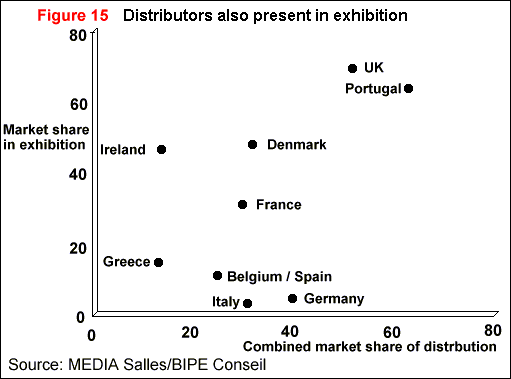
In our analysis, we have taken into account the financial links between the exhibition and distribution arms, but have also tried as far as it is possible to give weight to the cases where the companies consider themselves to be independent.
|
|
|||
|
|
|
|
|
| Belgium | Belga (Hemelaer)
Indep. Films Cine-libre Excelsior (1) |
25.0%
|
12.0%
|
| Denmark | Warner
Camera Metronome |
31.7%
|
48.5%
|
| France | UGC
Gaumont AMLF (Pathé) |
30.2%
|
33.5%
|
| Germany | Warner
Neue Constantin |
40.0%
|
6.0%
|
| Greece(e) | Elke
Spentzos Prooptiki |
13.5%
|
15.0%
|
| Ireland | Abbey
(Ward Anderson) |
12.0%
|
47.0%
|
| Italy | Penta (Cinema Cinque)
Istituto Luce |
37.5%
|
3.3% (2)
|
| Portugal | Lusomundo
Castelo Lopes |
60.0%
|
65.0%
|
| Spain | UIP (Cinesa)
Lauren films |
25.0%
|
13.0%
|
| U.K. | UIP (UCI)
Warner Rank |
51.0%
|
71.6%
|
| (1) Excelsior went into liquidation in
September 1993
(2) Only Penta Source: MEDIA Salles survey |
|||
"Indirect" vertical integration: "alignments"
In order to have an accurate picture of the sector, it is important
to take into account programming agreements, which have the effect of "indirectly"
establishing the mechanisms of integration as well as constituting vertical
restraints on the operation of the market.
In numerous countries, the extent of vertical integration is effectively
doubled by more or less formal exclusivity agreements between distributors
and exhibitors, commonly known as "alignments". The UK market is one arena
for exclusivity agreements between the US majors, film suppliers and the
circuits. In Spain, some distribution patterns in small towns have the
characteristics of exclusive agreements, whereas in Greece, distributors
are increasingly hiring cinemas, in order to control directly the release
of their films. But these practices are rarer where multiplexes are involved,
as these cinemas have to have an "all product" programming policy because
of the number of screens and the need for a multiplicity of suppliers to
fill them.
Even if the cinemas directly owned by the distributors are not restricted
to showing "own" films, the access of independent films to screens might
seem to be hampered by the extent of vertical integration. However, despite
the strong trends towards vertical integration within the market, the operators
who responded to this part of the qualitative study showed that this was
rarely the case: vertical integration does play a part in limiting access
to the films which are extremely profitable, where a distribution subsidiary
of a group can give preferential treatment to its sister companies, but
in the majority of cases, the difficulty of access of cinemas to films
was attributed to distributors' lack of interest in the less profitable
screens, or to too few prints being put into circulation.

Regulation
Table 16 shows legislation and regulation in
the various EU countries which deal with programming practices which could
be considered anti-competitive.
|
|
||||||
|
|
|
|
|
|
||
| Exclusive programming at the local level | Regulatory position | General law | None | Competition is regulated | General law on competition | No law pertaining specifically to exhibition |
| Regulatory authority | An action is being referred | - | The Cinema Mediator; Tribunal if legal action taken | "Cartel Office" at Länder and Federal level | - | |
| Powers of the authority | Restrictive | - | An indicative decision | Legal sanctions | - | |
| Effectiveness - actual position | Exclusivity does exist: US films
Þ the circuits;
Films from Ind.Þ Ind. cinema |
No problems of exclusivity | No sanctions (self-regulation) | - | Outside Dublin: monopolies
exclusive relations Dublin, multiplex = "all products" |
|
| Block-booking (rental of packages of films) | Regulatory position | General law | Not practised | Forbidden by regulation | Not forbidden | Illegal |
| Regulatory authority | - | - | The Mediator | - | - | |
| Powers of the authority | - | - | Indicative | - | - | |
| Effectiveness - actual position | - | Not practised | Often elaborate | - | - | |
|
|
||||||
|
|
|
|
|
|
||
| Exclusive programming at the local level | Regulatory position | New cinema law since March 1, 1994 | General competition law | New cinema law | General law on competition in 1989 | Films Order, 1989 |
| Regulatory authority | Anti-trust authority | Ministry of Economic Affairs | - | Tribunal defending competition | Office of Fair Trading (OFT) | |
| Powers of the authority | (1) | Legal arbitration | - | Legal sanctions | Little authority; mostly self-regulation | |
| Effectiveness - actual position | Regulatory authority has never been invoked | Exclusivity: standard practice in commercial cinemas, but changes since 1.1.93 | Lusomundo in the position of a quasi-cartel | Distribution patterns comparable to exclusive agreements in small towns | Local exclusivity - applies in 18 cities (and Dublin) | |
| Block-booking (rental of packages of films) | Regulatory position | No law | Practised, but not official | General law | Forbidden (by competition law) | General law "Fair Trading" |
| Regulatory authority | - | Arbitration by the Federation | No specific body for the cinema | Tribunal defending competition | OFT | |
| Powers of the authority | - | Arbitration | Not used | Legal sanctions | Rarely used | |
| Effectiveness - actual position | - | Few conflicts | Practised | Elaborate regulation by distributors | Exclusivity occurs | |